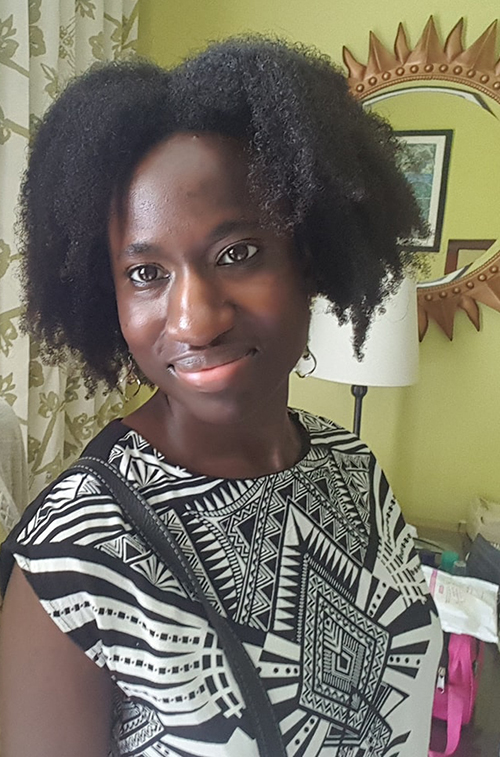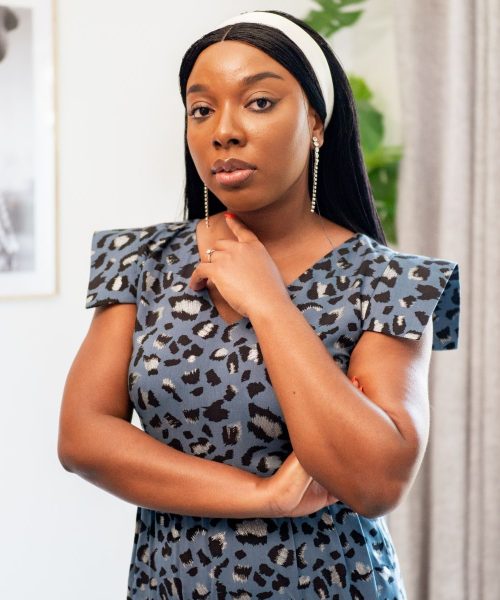IN Conversation
Entrepreneurship and Women Empowerment

Ivy Scarlett is a seasoned freelance writer and contributor with an editorial focus on the fashion and hospitality industries and diversity and inclusion within the creative sphere. Eight years committed and still going, Ivy has contributed to several national and international publications, some of which include but are not limited to; The Fox Magazine (US), Glam Africa Magazine, Mith Magazine (US), West London Living, and Life Is Art Magazine (US).

Elika Ashoori – Founder and Head Chef of Lilika’s Treats
www.lilikastreats.com
Instagram @lilikastreats
Entrepreneurs acquire most of their knowledge on the job. Can you think of a particular skill you have picked up from your experience as an entrepreneur? And how has it impacted your business and the way you work?
I fell into an entrepreneurial path by accident. When I started my business, I never thought of it as something that would pick up and become as big as it has! I remember taking photos of some muffins and chocolates I had made and creating a very poorly made website to showcase them. A friend suggested selling them in a shop or a market, but I was aware that getting into London’s buzzing food industry was challenging. Still, out of curiosity, I emailed the closest market to where I live, which happened to be the Greenwich market. They got back to me in a day, asking me to start the following week! That is how my business started, so nothing was planned financially or strategically, as you can imagine.
I had to learn everything from scratch. Everything I have learnt in the past seven years has been through trial and error. Some people may be horrified by this approach, but that’s just me with all things! I’m creatively minded, so I am not good at meticulously planning or doing tons of research. I would have found it too daunting if I had to learn all that I’ve learnt gradually through the years before starting!
I suppose you could say being an entrepreneur has made me more focused and organized in steady, gradual progress. You learn to pick up people skills, familiarise yourself with the market, i.e. what customers respond to, the big no-nos, and become more resilient. That has been the best thing about creating my business; it has made me more confident and given me a clear direction. When I was first starting, one of my weaknesses was not being able to say no when the situation calls for it (something that I still struggle with from time to time), but I’ve learnt to stand my ground and know my self-worth. I think that is something that benefits me both in business and in my personal life!
The global pandemic has forced most businesses to completely rethink their trading method and the way they interact with their customers. How did your business adapt, and how did you find the process?
COVID-19 has made business quite challenging. Being in the food industry, we are one of the most affected sectors. However, I consider myself incredibly lucky to operate both online and from a market stall; therefore, my business didn’t suffer as much as some shops in the first two months of the national lockdown. With the easing of lockdown, I managed to start retaking orders for private birthday parties and some of my regulars who hadn’t been able to eat out for a while. I was glad to be able to bring back a tiny bit of normality and happiness to people’s lives, in the shape of cakes and macarons!
2019 was a hectic and exhausting year for me. So, the lesser workload due to the lockdown was a blessing in disguise because it helped me re-centre, pump the brakes, and work on my business models. I did a thorough rebranding, updated my website, and got my finances in order. When you get swamped with work, your creativity gets pushed to the back seat slightly. Even though it might seem that I am always creating things, it does start to become repetitive. You don’t get to explore new avenues; you begin to lose your passion, which becomes a drag. Lockdown helped me fix this creative block– improve my skills, find my style, and revisit the feelings that made me want to do this job in the first place!
Why are women’s equality and empowerment essential to you?
I think we are lucky to live when we can see a positive shift in how society perceives women and our parts in society. However, there is still a lot more work to change the archaic perceptions of what women are and cannot do in the workspace.
In my field, I know that most people looking from the outside still see what I do as a glorified bake sale! No person who has not tried to drive an independent business can genuinely appreciate the monumental amount of work to be successful.
It is crucial to me to change this mindset, and so I speak out about this regularly. I want people to view what I do as Art. Like any other artist, I express myself through my work. I can spend days or even weeks on one creation, and it pains me that people would sometimes say things like, “Oh isn’t it nice what you do, making your cakes in your little kitchen…I bet it makes your partner so happy you’re such a good baker”. When men cook or bake, they are chefs and artists. Still, it is a lot harder for women to dissociate their careers from their gender, and have been perceived for hundreds of years as the “ones who have to be in the kitchen.” We are on the right path. However, there is still a lot more work to be done to achieve global equality and empowerment.
SO… do I belong in the kitchen? YES, and I wouldn’t have it any other way! My kitchen has let me bring to life a business from scratch, which has earned me my independence, identity, pride, and purpose. With statements such as “Women belong in the kitchen,” “women are more sensitive,” “women think emotionally,” “women are victims of abuse, “… it is up to us, women, to not let these statements cage us in an inferior category! Yes, I am emotional and sensitive and make most of my decisions from my heart. As a result of this, I have made many mistakes, but I’m proud of it. I have no regrets!
We are modern 21st-century women. We are strong and have the opportunity to slap bigots, chauvinists, and misogynists in the face with our success! Let us embrace our strength and keep fighting for what we deserve and what is rightfully ours!

Cash flow shortages are one of the most common reasons for new business failures. How have you managed your cash flow over the years?
Having an e-commerce shop gives you the flexibility to understand customer preferences and manage stock inventory efficiently. Every designer aspires to get a stockist, but they often cut hugely into the profit margin and have complicated terms that can also be very costly in the long run. I am relaunching Yemzi.com this month, and I’m excited to connect with my customers at a whole new level than ever before. Understanding customer needs and wants and offering products on-demand is a dream for cash flow.
I have been releasing one collection a year because it is manageable; with sustainability being on the tips of everyone’s tongues, it’s important to do less, waste less, be more environmentally aware.
As an independent fashion brand, to keep up with the ridiculous fashion calendar or even the plethora of new collection drops, collaborations, and events is impossible. I have always done what is manageable.
Tell us about your initiative in support of women’s empowerment?
Yemzi Design Workshops started about five years ago. I work with young people, especially teens, in secondary schools in Hackney, East London. I teach them how to do fashion illustrations, print designs and a basic level garment construction in a day to three-day course. The students learn about the design process and how they can incorporate their style into a clothing design. During the workshops, I share my journey and how they could also take a similar path as an independent fashion designer or a more commercial route in the creative industry employment.
What would you say are some of the key questions aspiring entrepreneurs should ask themselves before starting their journey?
As a young entrepreneur, one should ask if what they are doing aligns with who they are as individuals and how they contribute to a positive change.
Why are they doing it? They should also access the skills, resources, and funds available to succeed while also considering the support network available.

Why are women’s equality and empowerment necessary to you?
Women have so much to offer in society. By supporting equality and women’s empowerment, doors of opportunity are opened for women to learn new skills to become great innovators and businesswomen.
Entrepreneurs acquire most of their knowledge on the job. Can you think of a particular skill you have picked up from your experience as an entrepreneur? And how has it impacted your business and the way you work?
To be specific, it is learning Canva to design some of my logos. I have found Canva to be a great cost-effective tool to get creative and explore exciting ideas in the early stages of building my business.
How do you maintain the right work-life balance?
Maintaining a work-life balance is essential to me. I do a few things but are not limited to taking time out to do something I enjoy, such as cooking and reading. Additionally, I try to get in some small acts of self-care a couple of times a week.
Striking this balance is not always easy; as an entrepreneur, continually learning new skills and implementing them can take a lot of work. So, I make some quiet time for myself each day for meditation– it helps to relax my mind and relieve stress.
Plans for your business down the road?
I aim to be making five figures a month by selling my products on Amazon. My objective is to build a brand in the home and kitchen sector.

Priscillia Okpan – Womenswear Designer & Digital Content Creator, Kim Dave Designs
linktr.ee/kimdavedesigns
Instagram @kimdavedesigns
Would you say you have the right work-life balance?
Not quite. Having the right work-life balance is slightly trickier to achieve when you are self-employed because it is challenging to set boundaries when your home is also your office.
I love creating fashion and digital content; however, I do struggle with making time for myself.
I have found helpful scheduling all my activities ahead of time, including one or two rest days a week. It has made a difference in helping me have some quality time for my family and myself. Another useful thing is, having separate rooms for different activities– when I am in my studio, it’s time to work, and when I step out of it, it’s time for my personal life.
Entrepreneurs acquire most of their knowledge on the job. Can you think of a particular skill you have picked up from your experience as an entrepreneur? And how has it impacted your business and the way you work?
Time management and Diary planning–I used to leave it all to fate when I started, but I’ve realized that adding dates to my calendar makes my life a lot easier. Knowing in advance which events I have coming up helps me plan better and prevents me from forgetting important meetings.
Why are women’s equality and empowerment necessary to you?
Being biased towards a woman is a very short shirted mindset to have. The fact that we are women does not take away our ability to excel both at work and home. Women bring so much to the table. Aside from the apparent roles of being mothers and wives, women should be given more opportunities to do business, be creatives, take Executive roles and much more.












